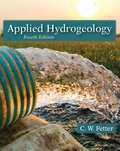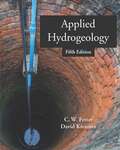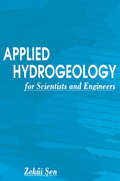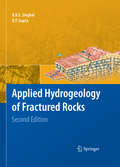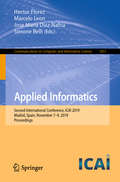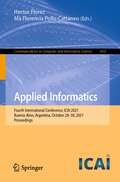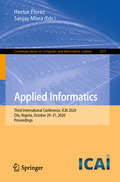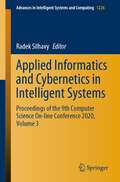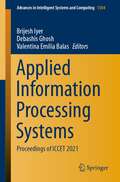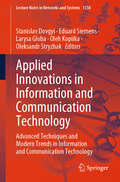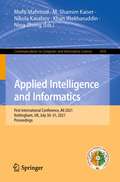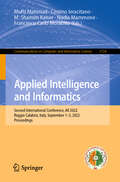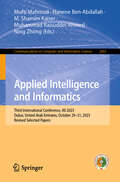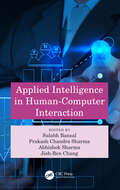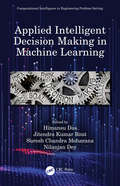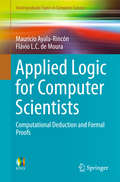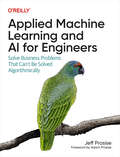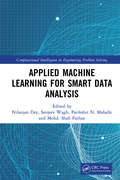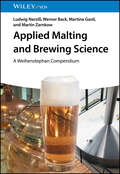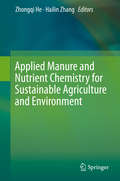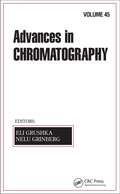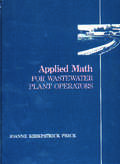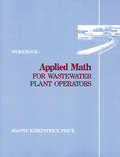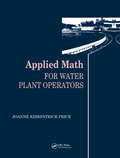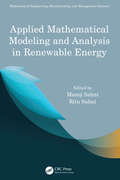- Table View
- List View
Applied Hydrogeology
by C. W. FetterHydrogeology¿s importance has grown to become an integral part not only of geology curricula, but also those in environmental science and engineering. Applied Hydrogeology serves all these students, presenting the subject¿s fundamental concepts in addition to its importance in other disciplines. Fetter skillfully addresses both physical and chemical hydrogeology, highlighting problem solving throughout the book.Case studies, Excel-based projects, and working student versions of software used by groundwater professionals supplement the fourth edition¿s insightful explanations and succinct solutions to real-world challenges. Each chapter concludes with example problems, a notation of symbols, and informative analysis. A glossary of hydrogeological terms adds significant value to this comprehensive text. Fetter¿s accessible coverage prepares readers for success in their careers well beyond the classroom.
Applied Hydrogeology
by C. W. Fetter David KreamerThere is a continued demand for well-trained and competent hydrogeologists, especially in the environmental sector. For decades, Fetter's Applied Hydrogeology has helped prepare students to excel in careers in hydrogeology or other areas of environmental science and engineering where a strong background in hydrogeology is needed. The text's long-standing tradition as a vital resource is further enhanced in the fifth edition by Kreamer’s added expertise. <p><p>Stressing the application of mathematics to problem-solving, example problems throughout the book provide students the opportunity to gain a much deeper understanding of the material. Some important topics include the properties of aquifers, the principles of groundwater flow, water chemistry, water quality and contamination, and groundwater development and management. The addition of new case studies and end-of-chapter problems will strengthen understanding of the occurrence and movement of ground water in a variety of geological settings.
Applied Hydrogeology for Scientists and Engineers
by Zekai SenIn order to properly plan, design, and operate groundwater resources projects, it is necessary to measure - over time or distance - pertinent groundwater variables such as drawdown and discharge in the field. Applied Hydrogeology for Scientists and Engineers shows how to assess and interpret these data by subsurface geological setup and processing. The book helps readers estimate relevant groundwater parameters such as storativity, transmissivity, and leakage coefficient.The text addresses many interrelated disciplines such as geology, hydrology, hydrogeology, engineering, petroleum geology, and water engineering. Traditional and current models for application are presented. One of the unique features of the book is the inclusion of new and previously unpublished ideas, concepts, techniques, approaches, and procedures developed by the author. Among these are hydrogeophysical concepts, slope matching techniques, volumetric approach solution for complicated groundwater flows, non-Darcian flow law applications, aquifer sample functions, dimensionless-type straight line methods, non-linear flow-type curves, discharge calculations from early time-drawdown data, storage coefficient estimation procedure for quasi-steady state flow, and much more. The pitfalls in aquifer test analysis are also detailed. Fractured medium flow adds yet another dimension to the book. Each method is supplemented by actual field data applications from worldwide case studies.Applied Hydrogeology for Scientists and Engineers covers the topics of groundwater reservoirs, the evaluation of aquifer parameters, aquifer and flow properties, flow properties and bore hole tests, aquifer tests in porous and fractured media, well hydraulics, groundwater flow and aquifer tests, and field measurements and their interpretations.This new reference also works well as a post-graduate textbook on the subject. Applied Hydrogeology for Scientists and Engineers expands the reader's knowledge by providing valuable information not found in any other publication.
Applied Hydrogeology of Fractured Rocks: Second Edition
by B.B.S. Singhal † R. P. GuptaHydrogeology is a topical and growing subject as the earth's water resources become scarcer and more vulnerable. More than half of the surface area of continents is covered with hard rocks of low permiability. This book deals comprehensively with the fundamental principles for understanding the hydrogeological characteristics of rocks, as well as exploration techniques and assessment. It also provides in depth discussion on structural mapping, remote sensing, geophysical exploration, GIS, groundwater flow modelling and contaminant transport, field hydraulic testing including tracer tests, groundwater quality, geothermal reservoirs, managed aquifer recharge, and resources assessment and management. Hydrogeological aspects of various lithology groups, including crystalline rocks, volcanic rocks, carbonate rocks and clastic formations have been dealt with separately, using and discussing examples from all over the world. It will be an invaluable text book cum reference source for postgraduate students, researchers, exploration scientists and engineers engaged in the field of groundwater development in fractured rocks. Applied Hydrogeology of Fractured Rocks - Second Edition is thoroughly revised and extended with a new chapter, updated sections, many new examples, and expanded and updated references.
Applied Informatics: Second International Conference, ICAI 2019, Madrid, Spain, November 7–9, 2019, Proceedings (Communications in Computer and Information Science #1051)
by Hector Florez Marcelo Leon Jose Maria Diaz-Nafria Simone BelliThis book constitutes the thoroughly refereed papers of the Second International Conference on Applied Informatics, ICAI 2019, held in Madrid, Spain, in November 2019.The 37 full papers and one short paper were carefully reviewed and selected from 98 submissions. The papers are organized in topical sections on bioinformatics; data analysis; decision systems; health care information systems; IT Architectures; learning management systems; robotic autonomy; security services; socio-technical systems; software design engineering.
Applied Informatics: Fourth International Conference, ICAI 2021, Buenos Aires, Argentina, October 28–30, 2021, Proceedings (Communications in Computer and Information Science #1455)
by Hector Florez Ma Florencia Pollo-CattaneoThis book constitutes the thoroughly refereed papers of the 4th International Conference on Applied Informatics, ICAI 2021, held in Buenos Aires, Argentina, in October, 2021.The 35 full papers were carefully reviewed and selected from 89 submissions. The papers are organized in topical sections on artificial intelligence; data analysis; decision systems; health care information systems; image processing; security services; simulation and emulation; smart cities; software and systems modeling; software design engineering.
Applied Informatics: Third International Conference, ICAI 2020, Ota, Nigeria, October 29–31, 2020, Proceedings (Communications in Computer and Information Science #1277)
by Hector Florez Sanjay MisraThis book constitutes the thoroughly refereed papers of the Second International Conference on Applied Informatics, ICAI 2020, held in Ota, Nigeria, in October 2020. The 35 full papers were carefully reviewed and selected from 101 submissions. The papers are organized in topical sections on artificial intelligence; business process management; cloud computing; data analysis; decision systems; health care information systems; human-computer interaction; image processing; learning management systems; software design engineering.
Applied Informatics and Cybernetics in Intelligent Systems: Proceedings of the 9th Computer Science On-line Conference 2020, Volume 3 (Advances in Intelligent Systems and Computing #1226)
by Radek SilhavyThis book gathers the refereed proceedings of the Applied Informatics and Cybernetics in Intelligent Systems Section of the 9th Computer Science On-line Conference 2020 (CSOC 2020), held on-line in April 2020. Modern cybernetics and computer engineering in connection with intelligent systems are an essential aspect of ongoing research. This book addresses these topics, together with automation and control theory, cybernetic applications, and the latest research trends.
Applied Information Processing Systems: Proceedings of ICCET 2021 (Advances in Intelligent Systems and Computing #1354)
by Brijesh Iyer Debashis Ghosh Valentina Emilia BalasThis book is a collection of selected high-quality research papers presented at the International Conference on Computing in Engineering and Technology (ICCET 2021), organized by Dr. Babasaheb Ambedkar Technological University, Lonere, India, during January 30–31, 2021. Focusing on frontier topics and next-generation technologies, it presents original and innovative research from academics, scientists, students and engineers alike. The theme of the conference is Applied Information Processing System.
Applied Innovations in Information and Communication Technology: Advanced Techniques and Modern Trends in Information and Communication Technology (Lecture Notes in Networks and Systems #1338)
by Stanislav Dovgyi Eduard Siemens Larysa Globa Oleh Kopiika Oleksandr StryzhakThis book highlights the most important research areas in Information and Communication Technologies and their impact on digital society and environment sustainable development namely the research in fields of information and communication technologies, artificial intelligence in ICT, data analytics, security of data and services, reducing energy consumption in the digital environment, and mathematical modeling for practical and research tasks in communication and data processing fields provided by various groups of researchers from Germany and Ukraine in cooperation with scientists from different countries. The presented studies contain a discussion on the use of artificial intelligence, in particular, methods of deep learning, practical implementation of the Internet of Things (IoT), the modern study of ECO monitoring systems; research in fields of mathematical modeling in applied problems. The book focuses on the basics of information and analytical activities in the digital global space, to providing broadband Internet access without decreasing the quality of experience (QoE) level, improving services providing, and system architecture for SDN. The study of modern communication and information technologies contains original works dealing with many aspects of their improvement and use for forecasting social and environment sustainable development based on global information space, as well as research that contains actual papers, which show some effective technological solutions that can be used for the implementation of novel cloud infrastructure and radio electronics systems. These results can be used in the implementation of novel systems and to promote the exchange of information in e-societies. Given its scope the book offers a valuable resource for scientists, lecturers, specialists working at enterprises, graduate and undergraduate students who engage with problems in Information and Communication Technologies as well as aspects of society and environment sustainable development.
Applied Intelligence and Informatics: First International Conference, AII 2021, Nottingham, UK, July 30–31, 2021, Proceedings (Communications in Computer and Information Science #1435)
by Nikola Kasabov Ning Zhong Mufti Mahmud M. Shamim Kaiser Khan IftekharuddinThis book constitutes the refereed proceedings of the First International Conference on Applied Intelligence and Informatics, AII 2021, held in Nottingham, UK, in July 2021. Due to the COVID-19 pandemic the conference was held in a fully virtual mode. The 26 full papers and 4 short papers presented were thoroughly reviewed and selected from the total 107 submissions. They are organized in the following topical sections: application of AI and informatics in disease detection; application of AI and informatics in healthcare; application of AI and informatics in pattern recognition; application of AI and informatics in network, security, and analytics; emerging applications of AI and informatics.
Applied Intelligence and Informatics: Second International Conference, AII 2022, Reggio Calabria, Italy, September 1–3, 2022, Proceedings (Communications in Computer and Information Science #1724)
by Mufti Mahmud Cosimo Ieracitano M. Shamim Kaiser Nadia Mammone Francesco Carlo MorabitoThis book constitutes the refereed proceedings of the Second International Conference on Applied Intelligence and Informatics, AII 2022, held in Reggio Calabria, Italy, during September 1–3, 2022. The 38 full papers included in this book were carefully reviewed and selected from 108 submissions. They were organized in topical sections as follows: Emerging Applications of AI and Informatics; Application of AI and Informatics in Healthcare; Application of AI and Informatics in Pattern Recognition; and Application of AI and Informatics in Network, Security, and Analytics.
Applied Intelligence and Informatics: Third International Conference, AII 2023, Dubai, United Arab Emirates, October 29–31, 2023, Revised Selected Papers (Communications in Computer and Information Science #2065)
by Ning Zhong Mufti Mahmud M. Shamim Kaiser Hanene Ben-Abdallah Muhammad Raisuddin AhmedThis book constitutes the refereed post-conference proceedings of the Third International Conference on Applied Intelligence and Informatics, AII 2023, held in Dubai, United Arab Emirates, during October 29–31, 2023. The 31 full papers included in these proceedings were carefully reviewed and selected from 99 submissions. They are organized in these topical sections as follows: Emerging Applications of AI and Informatics; Application of AI and Informatics in Healthcare; Application of AI and Informatics in Pattern Recognition; Application of AI and Informatics in Network, Security, and Analytics.
Applied Intelligence in Human-Computer Interaction
by Abhishek Sharma Jieh-Ren Chang Sulabh Bansal Prakash Chandra SharmaThe text comprehensively discusses the fundamental aspects of human– computer interaction, and applications of artificial intelligence in diverse areas including disaster management, smart infrastructures, and healthcare. It employs a solution-based approach in which recent methods and algorithms are used for identifying solutions to real-life problems. This book: • Discusses the application of artificial intelligence in the areas of user interface development, computing power analysis, and data management. • Uses recent methods/algorithms to present solution-based approaches to real-life problems in different sectors. • Showcases the applications of artificial intelligence and automation techniques to respond to disaster situations. • Covers important topics such as smart intelligence learning, interactive multimedia systems, and modern communication systems. • Highlights the importance of artificial intelligence for smart industrial automation and systems intelligence. The book elaborates on the application of artificial intelligence in user interface development, computing power analysis, and data management. It explores the use of human–computer interaction for intelligence signal and image processing techniques. The text covers important concepts such as modern communication systems, smart industrial automation, interactive multimedia systems, and machine learning interface for the internet of things. It will serve as an ideal text for senior undergraduates, and graduate students in the fields of electrical engineering, electronics and communication engineering, computer engineering, and information technology.
Applied Intelligent Decision Making in Machine Learning (Computational Intelligence in Engineering Problem Solving)
by Himansu Das Jitendra Kumar Rout Suresh Chandra Moharana Nilanjan DeyThe objective of this edited book is to share the outcomes from various research domains to develop efficient, adaptive, and intelligent models to handle the challenges related to decision making. It incorporates the advances in machine intelligent techniques such as data streaming, classification, clustering, pattern matching, feature selection, and deep learning in the decision-making process for several diversified applications such as agriculture, character recognition, landslide susceptibility, recommendation systems, forecasting air quality, healthcare, exchange rate prediction, and image dehazing. It also provides a premier interdisciplinary platform for scientists, researchers, practitioners, and educators to share their thoughts in the context of recent innovations, trends, developments, practical challenges, and advancements in the field of data mining, machine learning, soft computing, and decision science. It also focuses on the usefulness of applied intelligent techniques in the decision-making process in several aspects. To address these objectives, this edited book includes a dozen chapters contributed by authors from around the globe. The authors attempt to solve these complex problems using several intelligent machine-learning techniques. This allows researchers to understand the mechanism needed to harness the decision-making process using machine-learning techniques for their own respective endeavors.
Applied Logic for Computer Scientists: Computational Deduction and Formal Proofs (Undergraduate Topics in Computer Science)
by Mauricio Ayala-Rincón Flávio L. C. de MouraThis book provides an introduction to logic and mathematical induction which are the basis of any deductive computational framework. A strong mathematical foundation of the logical engines available in modern proof assistants, such as the PVS verification system, is essential for computer scientists, mathematicians and engineers to increment their capabilities to provide formal proofs of theorems and to certify the robustness of software and hardware systems. <P><P> The authors present a concise overview of the necessary computational and mathematical aspects of ‘logic’, placing emphasis on both natural deduction and sequent calculus. Differences between constructive and classical logic are highlighted through several examples and exercises. Without neglecting classical aspects of computational logic, the authors also highlight the connections between logical deduction rules and proof commands in proof assistants, presenting simple examples of formalizations of the correctness of algebraic functions and algorithms in PVS. <P> Applied Logic for Computer Scientists will not only benefit students of computer science and mathematics but also software, hardware, automation, electrical and mechatronic engineers who are interested in the application of formal methods and the related computational tools to provide mathematical certificates of the quality and accuracy of their products and technologies.
Applied Machine Learning and AI for Engineers: Solve Business Problems That Can't Be Solved Algorithmically
by Jeff ProsiseWhile many introductory guides to AI are calculus books in disguise, this one mostly eschews the math. Instead, author Jeff Prosise helps engineers and software developers build an intuitive understanding of AI to solve business problems. Need to create a system to detect the sounds of illegal logging in the rainforest, analyze text for sentiment, or predict early failures in rotating machinery? This practical book teaches you the skills necessary to put AI and machine learning to work at your company. Applied Machine Learning and AI for Engineers provides examples and illustrations from the AI and ML course Prosise teaches at companies and research institutions worldwide. There's no fluff and no scary equations—just a fast start for engineers and software developers, complete with hands-on examples. This book helps you: Learn what machine learning and deep learning are and what they can accomplishUnderstand how popular learning algorithms work and when to apply themBuild machine learning models in Python with Scikit-Learn, and neural networks with Keras and TensorFlowTrain and score regression models and binary and multiclass classification modelsBuild facial recognition models and object detection modelsBuild language models that respond to natural-language queries and translate text to other languagesUse Cognitive Services to infuse AI into the apps that you write
Applied Machine Learning for Smart Data Analysis (Computational Intelligence in Engineering Problem Solving)
by Nilanjan Dey Sanjeev Wagh Parikshit Mahalle Mohd. PathanThe book focusses on how machine learning and Internet of Things (IoT) has empowered the advancement of information driven arrangements including key concepts and advancements. Divided into sections such as machine learning, security, IoT and data mining, the concepts are explained with practical implementation including results.
Applied Malting and Brewing Science: A Weihenstephan Compendium
by Ludwig Narziß Werner Back Martina Gastl Martin ZarnkowApplied Malting and Brewing Science The landmark guide to malting and brewing science is available in English for the first time Humans have been producing fermented beverages for at least ten thousand years. Chief among them is beer, which has arguably never been more popular than it is at this point in history. The United States alone boasts more than 9,500 breweries, a number which has risen steadily as the market for craft beer continues to grow in that country. Thus, maltsters and brewers there and around the world are constantly looking for ways to hone their skills to create products of the highest quality as consistently as possible. With the detailed information presented in this book, they will not only be able to reacquaint themselves with the basic tenets of their profession but will also acquire an in-depth scientific foundation and a wide range of practical knowledge in all aspects of advanced malting and brewing. This landmark work on malting and brewing, originally entitled Abriss der Bierbrauerei, is currently in its eighth edition and has hitherto only been offered in the German language. However, it is now finally available for the first time in translation, as an unabridged and updated English edition. Applied Malting and Brewing Science is a reference for those interested in any facet of malt and beer production, including all of the most recent technical innovations in equipment and processes. This book represents the collective knowledge amassed over many decades of research by Ludwig Narziß in his tenure as Professor at the Chair for Brewing Technology at Weihenstephan. Readers of Applied Malting and Brewing Science will find the following: Comprehensive treatment of topics covering raw materials, malt and wort production, fermentation, packaging and much more A team of authors with decades of experience in the fields of malting and brewing science, both in academia and in their application in the industry A design which facilitates use of the book as both a student textbook and as a practical guide Written by the late Ludwig Narziß and his team, Applied Malting and Brewing Science is an indispensable source for students at any level in related scientific disciplines and for anyone working in the malting and brewing industry.
Applied Manure and Nutrient Chemistry for Sustainable Agriculture and Environment
by Zhongqi He Hailin ZhangDue to the rapid increase in world population and improving living standards, the global agriculture sector is confronting with challenges for the sustainability of agricultural production and of the environment. Intensive high-yield agriculture is typically dependent on addition of fertilizers (synthetic chemicals, animal manure, etc. ). However, non-point nutrient losses from agricultural fields due to fertilization could adversely impact the environment. Increased knowledge on plant nutrient chemistry is required for improving utilization efficiency and minimizing loses from both inorganic and organic nutrient sources. For this purpose, the book is composed of 19 chapters that highlight recent research activities in applied nutrient chemistry geared toward sustainable agriculture and environment. Topics of interest include, but are not limited, to speciation, quantification, and interactions of various plant nutrients and relevant contributories in manure, soil, and plants. This book outlooks emerging researchable issues on alternative utilization and environmental monitoring of manure and other agricultural by products that may stimulate new research ideas and direction in the relevant fields.
Applied Materials Science: Applications of Engineering Materials in Structural, Electronics, Thermal, and Other Industries
by Deborah D. ChungMaterials are the foundation of technology. As such, most universities provide engineering undergraduates with the fundamental concepts of materials science, including crystal structures, imperfections, phase diagrams, materials processing, and materials properties. Few, however, offer the practical, applications-oriented background that their stud
Applied Math for Wastewater Plant Operators
by Joanne K. PriceWith many worked examples, this book provides step-by-step instruction for all calculations required for wastewater treatment. Pertinent calculations are conveniently summarized in each chapter. The text covers all the fundamental math concepts and skills needed for daily wastewater treatment plant operations. The workbook for this book can be purc
Applied Math for Wastewater Plant Operators - Workbook
by Joanne K. PriceThis workbook is a companion to Applied Math for Wastewater Plant Operators (ISBN: 9780877628095) and part of the Applied Math for Wastewater Plant Operators Set (ISBN: 9781566769891). It contains self-teaching guides for all wastewater treatment calculations, skill checks, hundreds of worked examples, and practice problems.
Applied Math for Water Plant Operators
by Joanne K. PriceWith many worked examples, this book provides a step-by-step training manual for water treatment calculations. It presents all the fundamental math concepts and skills needed for daily water treatment plant operations. The text covers volume, flow and velocity, milligrams per liter to pounds per day, loading rate, detention and retention times, eff
Applied Mathematical Modeling and Analysis in Renewable Energy (Mathematical Engineering, Manufacturing, and Management Sciences)
by Manoj Sahni Ritu SahniThis reference text introduces latest mathematical modeling techniques and analysis for renewable energy systems. It comprehensively covers important topics including study of combustion characteristics of laser ignited gasoline-air mixture, hierarchical demand response controller, mathematical modeling of an EOQ for a multi-item inventory system, and integration and modeling of small-scale pumped storage with micro optimization model (HOMER). Aimed at graduate students and academic researchers in the fields of electrical engineering, environmental engineering, mechanical engineering, and civil engineering, this text: Discusses applied mathematical modeling techniques in renewable energy. Covers effective storage and generation of power through renewable energy generation sources. Provides real life applications and problems based on renewable energy. Covers new ways of applying mathematical techniques for applications in diverse areas of science and engineering.
